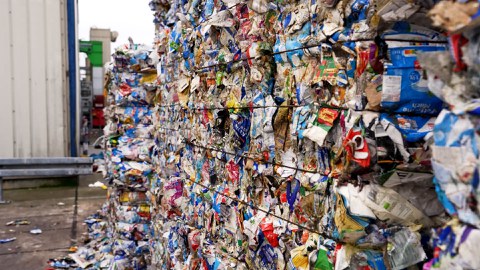Apr 28, 2023
Plastic recycling, waste exports abroad, microplastics in the oceans: How do we solve the problem of waste?
According to the Federal Statistical Office (Destatis), nearly half a ton of household waste was generated per capita in Germany in 2021 - more than ever before. At TU Dresden, scientists are researching how we can recycle more of our waste, what effect waste exports abroad have, and whether alternative packaging can help solve our waste problem.
“We achieve promising results when recycling glass or paper,” says Professor Christina Dornack from the Institute of Waste Management and Circular Economy at TU Dresden. The situation is more complicated when it comes to plastic: “This is because a lot of packaging consists of several layers of plastic, making it difficult to recycle and reuse these materials.” In these cases, the sorting machines used by the recycling industry are often unable to clearly identify the type of plastic, meaning that packaging can only be thermally recycled. The expert therefore advocates the production of packaging using mono-materials. These can be subsequently processed into plastic chips for the production of new packaging. The basis for this, however, is that consumers themselves separate their waste conscientiously and correctly.
In addition to waste processing in Germany, large quantities of waste are also exported abroad. Professor Edeltraud Günther of the United Nations University UNU-FLORES is familiar with the pros and cons associated with exporting waste. For example, it can make sense to transfer waste to countries that are technically better equipped to carry out the recycling process. “Actually, it’s usually the case that waste is shipped abroad because it is cheaper to process there.” More than 80% of electronic waste is shipped in an unmonitored way to the global south, she explains. New legislation, such as the laws recently implemented by the EU parliament, could herald innovative change in this area. “With the scarcity of resources becoming an omnipresent topic, we will soon not want to let raw materials go to waste,” Prof. Günther adds.
But trash also makes an appearance in a more inconspicuous form: as microplastics. At the Institute of Water Chemistry of TU Dresden, Professor Stefan Stolte has been researching the amount of microplastic that is produced when clothes are washed. “In Germany alone, we have discovered that this is around several tons per year.” These microscopic fibers are washed out of synthetic fabrics like fleece. Microplastics can remain in the water for decades or even centuries and can pose significant health problems, especially for smaller organisms that ingest the particles as food, the chemist explains. To reduce the amount of microplastics, he says, everyone can try to wash their clothes less frequently and to generally buy fewer new items of clothing. Prof. Stolte doesn’t think it’s feasible to completely do away with synthetic fabrics, as there wouldn’t be enough land to produce the necessary biodegradable cotton.
But we could at least partially replace plastic in other instances. At the Institute of Natural Materials Technology, research is being conducted into alternative packaging and into reducing the amount of material used in plastic packaging. “We live in a place where we can’t produce everything ourselves. So it’s necessary to transport products from A to B in a protected way,” says Christiane Otto from the Chair of Processing Machines and Processing Technology. In some cases, however, plastic packaging could be replaced by fiber-based plastics, reusable packaging or organic packaging materials. “One option is to use microalgae.” These are available in large quantities and can now even be processed into sealable packaging material thanks to the innovative new process. For example, this could be used to package dishwasher tabs in the future.
More information about the problem of waste, research in the field and possible solutions are discussed in the video “Gute Frage” (Good question) on the YouTube channel “TU Dresden entdecken” (Discover TU Dresden). The video is only available in German.
Contact:
TU Dresden Press Office
Prof. Christina Dornack
Institute of Waste Management and Circular Economy
Prof. Edeltraud Günther
UNU-FLORES
Prof. Stefan Stolte
Institute of Water Chemistry
Dr. Christiane Otto
Institute of Natural Materials Technology

